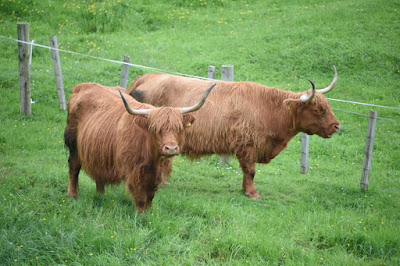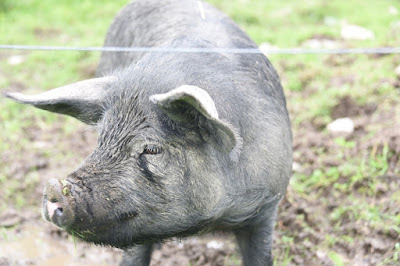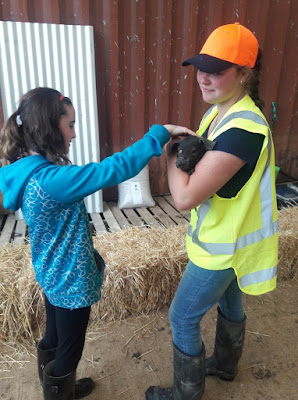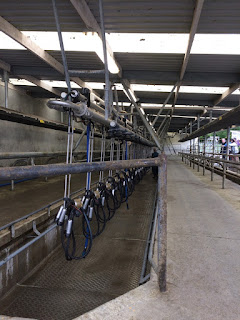Green Acres is the place for me.
Farm living is the life for me.
Land spreading out so far and wide.
Keep Manhattan, just give me that countryside.
- Eddie Albert, Theme to "Green Acres"
I have already mentioned the similarities between Palmerston North, NZ and Iowa City, IA (USA). Both manage to offer most of what much larger cities do, yet they are small enough to be easily navigable. They are both made to seem much bigger than they are because of the presence of universities that attract diverse international populations of students, professors, staff, and their families. Another similarity is in their rural surroundings. Whether you are in IC or Palmy, a short 5 minute drive outside of the city puts you in a rural, agrarian setting.
It wasn't that long ago in our history that pretty much everyone had some connection to a farm and a consequent understanding of where our food comes from. As America's population has become more urban, most of us have lost that connection. In a lot of America, that disconnection started several generations ago; but in certain pockets, like much of Iowa, that connection is not so far removed. In New Zealand, it isn't far removed at all.
People here are intimately aware of how life begins, how unfair it can be, where our food comes from, and how it gets here. When Kari and Little H went to the local A&P (Agricultural and Pastoral) fair, they encountered a piglet, the runt of the litter, with a lame leg and some difficulty getting its "fair share" of nursing time. One little boy was lamenting its fate and concerned it might die. As they moved on, his mother stated "That's life on the farm."
People here are intimately aware of how life begins, how unfair it can be, where our food comes from, and how it gets here. When Kari and Little H went to the local A&P (Agricultural and Pastoral) fair, they encountered a piglet, the runt of the litter, with a lame leg and some difficulty getting its "fair share" of nursing time. One little boy was lamenting its fate and concerned it might die. As they moved on, his mother stated "That's life on the farm."
This week-end, we ventured out on the Horowhenua Taste Trail. Eight rural businesses opened their operations to visitors for the day. They included working farms, an eel processing operation, a candy factory, and a winery.
We started out at Woody's Free Range Farm. They breed and grow 100% pasture-raised Heritage pig breeds and use no antibiotics or hormones. They are a small operation but do have meat packs available online and I can't wait to try what they have to offer. We put on our gummies (rubber boots) and got to tramp around a little bit. Unfortunately, all the rain we have had lately caused their stream to flood and closed off access to a large portion of their farm.
Highland Cattle need to get their bangs cut. They always remind me of that sheepdog from the Roadrunner cartoons.




Two of the Heritage pig varieties at the farm ... Large Black and Berkshire pigs


Once the piglets are no longer suckling, they are called "Weaners" ... Little H (and my inner 4 year-old) giggled.




Two week old piglets are still cute ... and not nearly as smelly.


Farm scenes ... even in the overcast, grey, drizzly conditions, the colours were amazing.







We left Woody's and headed to Takapu Farm. First settled as a farm in 1865, the Keeling family that has been working on this site ever since is now into their 5th generation. When Mr Keeling started working the farm in the 1960's, he had sheep, dairy cattle, beef cattle, and he even tried his hand at farming deer. He found that he could not run the farm profitably while being so diversified, so he concentrated on beef and dairy. At one point, he almost lost the farm, but he purchased the adjacent farm and doubled the size of his operation. He thinks the farm will now be sustainable for at least another generation. He runs the beef operation and his son runs the dairy operation but his son is taking over more and more as he slowly steps away. He grew up on this land, running on the hills, swimming in the lake, shooting possums in the woods, and he says that he has found paradise.
The milking shed can hold 50 cows. Twenty-five get milked at a time and it takes about 8 minutes. Each cow gets milked twice daily and produces about 16L/4gal of milk. Cows will continue to have calfs (and produce milk) for 3-5 years, but a few might do so for 10+ years. Once they can no longer calf, "they take a ride in the truck." Little H asked what that means and Kari replied "Steak."






In autumn, adult Long Fin and Short Fin eels leave the fresh water streams of New Zealand and head out to sea to spawn. No-one knows exactly where they go, but the suspicion is into the deep waters of the Tropical South Pacific. The adults die after spawning, and after the eggs hatch, the larvae float to the surface and drift back to New Zealand. A traditional food for the Maori people, there is also a commercial fishery for NZ consumption and export to Asia and the U.S.
The Levin Eel Tranding Co has been in operation since 1978. Eel are harvested in nets and transported to their facility. They are held in large tanks for 2 days, then processed. The facility in the picture below is storing about 10K live eels. The eel we tried had a flavour and texture similar to smoked salmon.




As you might imagine, the place smelled like a giant home aquarium. We left the farm animals behind and went to see how Genoese Pesto runs things. This is a local business that grows their basil in Fiji because of the year-round growing season, then cleans, processes, and packages it locally. Unfortunately, they did not allow any photo taking in their factory.
The next stop was a little sweeter, though. A quick stop to RJ's Licorice to satisfy our sweet tooth, then on to Woodhaven Gardens. This small, family-run produce farm started with 50 hectares providing potatos to the U.S. Marine base during WWII and now farms over 12000 hectares. They have employees from 21 different countries, so each day they fly a different nationality's flag "to make them feel a little more at home." When we visited, the Flag of the Day was France.
Food truck culture is huge here. Even some of the traditional brick and mortar restaurants have traveling kitchens. There are trucks in the local town square and they can be found at just about every local event.




One the many things that struck me when we first moved to New Zealand was the size of the asparagus in the produce stores. Stalks as thick as a pinky finger are the standard and as thick as my thumb are not uncommon. I find the thicker stalks tough and woody and prefer the really skinny ones typical in a U.S. supermarket. At the Tendertips Asparagus farm, we found out why. The larger stalks are preferred by local consumers and the farm's large export market. Too thin for the market and export, the thinner stalks are set aside to be sold in their farm store only.
Asparagus take 2-3 years to start producing edible stalks and will continue to do so for about 15 years. The picking season is about 100 days long and all of their pickers are young men from the same village in Samoa. The picking is all done by hand, and it is back-breaking work walking the rows, cutting and picking, from about 4:30 am to about 2 pm every day. They are paid by the weight of what they pick and their top picker made about $2000 NZ last week.
The initial sorting is done by hand, then a computer controlled sorter places the individual stalks into bundles. The final bundles are inspected, weighed, and packed by hand. The packs are dipped in a hot water bath to kill any bugs then sent directly to the cooler so they don't have to use any pesticides.
One of our favourite cafes, The Little White Rabbit, had a food truck set up inside the processing plant selling asparagus inspired foods.






It was a pretty amazing day that involved a lot of driving, a lot of walking through muck and manure, and an assault on the nasal senses that will not soon be forgotten. We got to meet some local business people we otherwise wouldn't have and found a few gems that we will definitely continue to look for online and in the produce store. It was also a reminder that there are people out there who we don't normally think about but who also work hard and take pride in what they do.

Peace ...









Great post.
ReplyDeleteon an unrelated note, so, earthquakes and tsunamis . . . you guys o.k.?